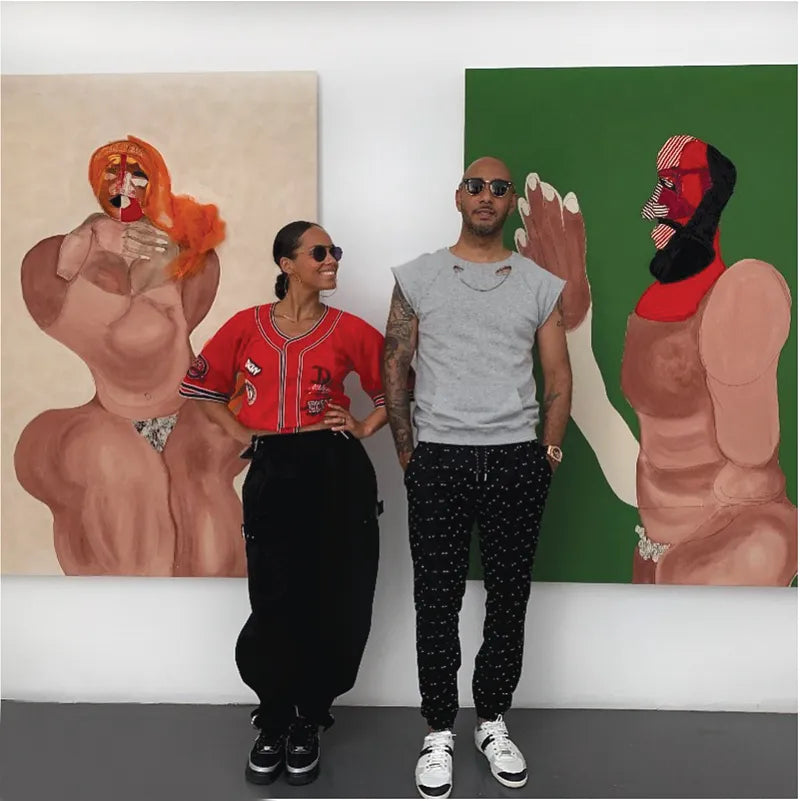AFRIKANIZM ART NEWS

Guardians of Culture: Alicia Keys & Swizz Beatz Champion African and Diasporic Art
Artistic Custodians: The Dean Collection & "Giants" Exhibition
Alicia Keys and Swizz Beatz—through over two decades of intentional collecting—have amassed a collection boasting nearly 1,000 works from both African and African-American artists, including Gordon Parks, Kehinde Wiley, Lynette Yiadom-Boakye, Jordan Casteel, and Toyin Ojih Odutola. Their collection is guided by purpose: they view themselves not merely as buyers, but as custodians of culture, intimately connected with the creators (architecturaldigest.com, new.artsmia.org, brooklynmuseum.org).
Their landmark exhibition, “Giants: Art from the Dean Collection”, curated by the Brooklyn Museum, showcases nearly 100 key works by multigenerational Black diasporic artists. It has travelled from New York to Atlanta’s High Museum, where the Deans underscored the message that “this collection is your collection”, inviting everyone to participate in the celebration of Black creativity.
Impact & Empowerment: Artists First
Swizz Beatz and Alicia Keys embrace the philosophy “artists supporting artists.” Their collection—and associated programming like artist residencies and festivals—promotes living creators such as Deana Lawson, Meleko Mokgosi, Amy Sherald, and Arthur Jafa. By nurturing relationships, commissioning work, and hosting events, they elevate underrepresented voices and ensure their presence in global cultural narratives.
Cultural Value & Representation
Through their platforms, the Deans challenge institutional barriers and historical marginalisation. At the Brooklyn Museum opening, they publicly called for custodianship over mere ownership and elevated the contributions of Black artists as essential to art history—not optional extras.
Their exhibitions spark expansive conversations about identity, power, and aesthetics, reframing African and diasporic art as central—not peripheral—to contemporary culture.
Broader Influence: Beyond Collection
As co-chairs of the Gordon Parks Foundation, Alicia and Kasseem oversee preservation of the photographer’s legacy, ensuring that future generations can access and learn from Parks’s work. They use their influence to integrate art into broader creative ecosystems, including planned art‑music centres and educational initiatives.
Their Los Angeles estate, “Dreamland,” serves as a creative space where art, music and architecture coalesce—filled with curated pieces by African and Black artists, with many of them personally known to the couple.
Culture in Motion
Through The Dean Collection and exhibitions like “Giants”, Alicia Keys and Swizz Beatz have crafted a cultural ecosystem where African and diasporic art is not just collected, but celebrated, commissioned, and shared with the world. Their approach goes beyond ownership—they prioritise living artists, fostering direct relationships and creating platforms where Black creatives are seen, heard, and valued. By integrating art into their personal spaces, musical practice, and philanthropic efforts, they blur the boundaries between disciplines, transforming how culture is experienced. More than a collection, it’s a movement—one that preserves legacy, challenges exclusion, and shapes a more inclusive global art narrative through ongoing dialogue, community engagement, and institutional influence.
Final Reflections
Alicia Keys and Swizz Beatz are more than collectors—they are cultural champions building a bridge between past, present, and future. Through passion, purpose, and patronage, their work elevates art that speaks across generations and geographies. They remind us: African creativity is everywhere, timeless, and worthy of stewardship.








No comments